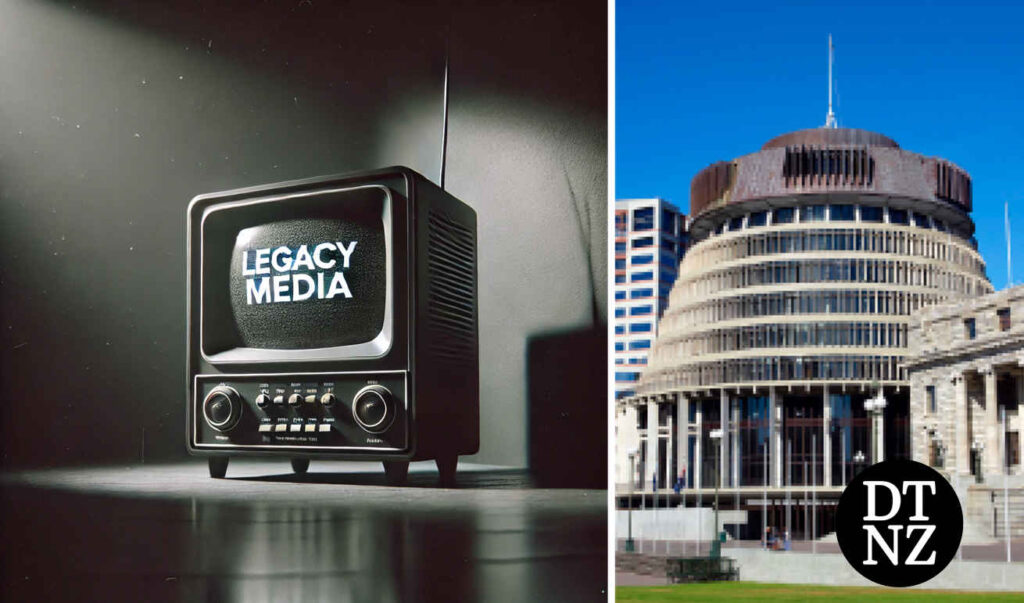In a bid to support the country’s struggling legacy media sector, the government has proposed the ‘Fair Digital News Bargaining Bill.’
Modelled closely on Australia’s digital bargaining code, the legislation aims to help local media companies earn revenue from the news they produce. However, critics argue that this move will backfire, leading to unintended consequences and stifling genuine innovation.
Minister of Media and Communications Paul Goldsmith recently announced the bill, emphasising the need to align it with Australia’s framework. He stated, “The key change is adopting a ministerial designation framework. This will enable the Minister to decide which digital platforms are captured by the bill, allowing the Government to manage unintended consequences.” He also highlighted the appointment of an independent regulator to oversee the bill’s implementation.
But opposition to the bill has been vocal. Sean Plunkett, host of the Platform, was highly critical of the move. “If the government proceeds with this and imposes, or connives with legacy media to extract money out of Meta, that organisation will block news stories being shared and posted on Facebook, on its platforms in New Zealand,” he said, referencing Meta’s actions in Canada. Plunkett said independent media outlets, like the Platform, could be collateral damage in this policy, losing crucial platforms for audience engagement.
Plunkett’s criticism extends to the ideological underpinning of the bill. “They have clearly been convinced by the whining legacy media that we live in some sort of socialist utopia, where the government compels private companies that do well to give money to private companies that aren’t doing well,” he remarked.
“This is very bad legislation and it is propping up people who have destroyed their own businesses. And it will do nothing for the independents and the quality of truth-seeking in our news media.”
Speaking with Plunkett political commentator Chris Trotter echoed these sentiments, describing the bill as one of the government’s “stupidest moves.” He criticised the bill’s selective approach, which he sees as a “protection racket” aimed at extorting money from tech giants like Google and Meta.
“These are not people you can wag a finger at, and the reason they got so big is because they’re on the wave of the future,” Trotter argued, suggesting that the bill misunderstands the power dynamics at play.
The government’s decision to tweak the New Zealand Screen Production Rebate and remove outdated advertising restrictions has also been met with skepticism. While these measures aim to provide immediate relief, critics argue they are insufficient for fostering long-term innovation and sustainability in the media sector.
The public reaction on social media has been overwhelmingly negative, with many Twitter users describing the bill as “worse than the PIJF (Public Interest Journalism Fund)” and accusing the government of “propping up the propaganda of failing mainstream news media.” This sentiment reflects a broader discontent with perceived government overreach and support for legacy media at the expense of independent journalism.
Sean Plunket has spoken to Meta and they have confirmed without a doubt they will pull news on their platforms from NZ, as they have done in Canada and are about to do in Oz.
Sean says this is the most bone headed decision ever and Nats have just told the voters they are the… pic.twitter.com/jpDcu92On6
— Holyhekatuiteka (@2ETEKA) July 4, 2024
The bill’s reliance on political support is also precarious. The ACT party has openly opposed the bill, although the coalition’s other members have agreed to proceed without ACT’s backing.
In Canada, the experience with the similar Online News Act has provided a cautionary tale. When Canada implemented its version of the digital bargaining code Meta responded by blocking news content on its platforms, leading to significant disruption in news dissemination. Critics in Canada argued that the legislation favoured large media conglomerates while sidelining smaller, independent news outlets. This has raised concerns that New Zealand could face similar challenges, with the potential for digital platforms to restrict access to news content, further complicating the media landscape.
Both Plunkett and Trotter question the integrity of the legacy media companies benefiting from the bill. Trotter speculated about possible quid pro quo arrangements between these companies and the government, which could undermine public trust. “The moment you take the money as a news outlet, the public’s trust and confidence in you goes down,” Trotter warned.
“The government appears to have totally bought the mainstream media narrative, that somehow democracy or news coverage is in crisis because their crappy business models aren’t working. It just seems intellectually lazy to me, and also at odds with what I thought was [a philosophy] of smaller government, less intervention and letting the market decide,” said Plunkett.

There’s only one government.
It doesn’t really matter if it’s the red team or the blue team behind the wheel at any given time.
There’s only ONE government. You’ll get the same globalist WEF policies no matter which way you vote. And killing/neutralising independent online media has been on their wish list since 2016.
Don’t care, I’m still not watching or listening to the MSM. Making them all government employees just flushes their credibility even further down the toilet pipe.
National are globalist cucks just like Labour… who wouldve thought?
So are ACT, NZ 1st, Te Maori Pa’Ti, The Greens…. is there anyone that I’ve forgotten?
It’s so depressing that no one can get out of the loop, over and over.
It is as revealing watching the lengths gone to by corporate technofascist globalists (uni-party ‘politicians, MSM, corporations, NGOs, academe et al.) an explicit collectivist tyranny endeavoring to insulate its fragile brittle ideology and its multiple dependent narratives. The invertebrate MSM, Fourth Estate turned Fifth Column against the populace, desperate to maintain overpaid roles in circular reasoning, to control propaganda and indoctrination, and to bolster the supra-national treachery of the Government Corporation playing “nation State” appear trapped in a self-defeating agenda. Their jobs will mostly be erased by AI; the globalists lead this charge.